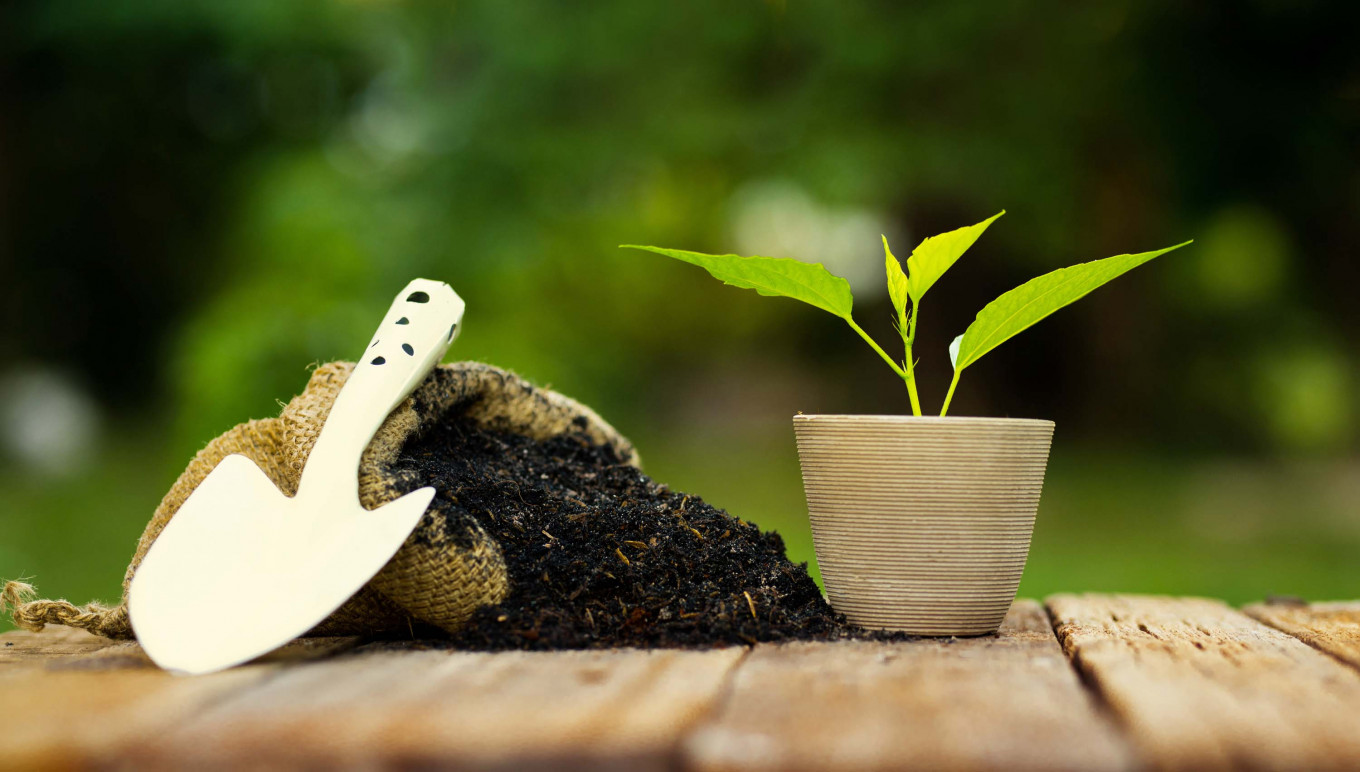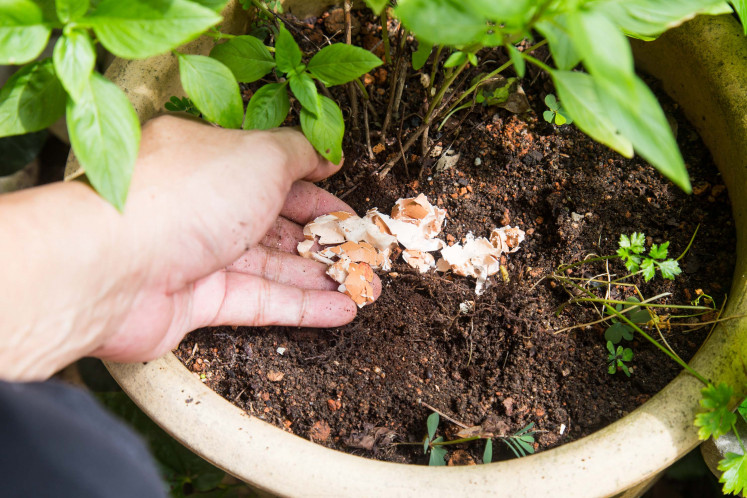Popular Reads
Top Results
Can't find what you're looking for?
View all search resultsPopular Reads
Top Results
Can't find what you're looking for?
View all search resultsComposting gains popularity amid COVID-19
Urban farmers use their organic household waste, ranging from food waste like remnants of vegetables, fruit skin and fish bones to fallen leaves to make compost to fertilize their homegrown vegetables, typically water spinach.
Change text size
Gift Premium Articles
to Anyone
T
aking up a new hobby upon moving to a new house during the COVID-19 pandemic, Corry Elyda, a 34-year-old professional living in South Tangerang, Banten, decided to become an urban farmer in April 2020.
Realizing just how environmentally-unfriendly chemical fertilizers are, in June this year, she decided to take a composting workshop to learn how to make her own organic fertilizer.
The Merriam-Webster’s Dictionary defines compost as a mixture of largely decayed organic matter than can be used to fertilize and condition land.
Urban farmers use their organic household waste, ranging from food waste like remnants of vegetables, fruit skin and fish bones to fallen leaves to make compost to fertilize their homegrown vegetables, typically water spinach.
Urban composting has gained so much in popularity that in late July, an organization called Kota Tanpa Sampah (City Without Trash) organized a virtual composting festival. The workshop Corry joined was also a bimonthly event organized by the organization.
Kota Tanpa Sampah is the brainchild of LabTanya, an ecologically-minded design organization that wants to encourage the use of various research methods among urban communities.
Adi Wibowo, one of Kota Tanpa Sampah’s cofounders, said there were two composting processes: aerobic and anaerobic.
The aerobic process reduces the release of methane gas. “This is a simpler technique that urban farmers can try at home,” he said.
The anaerobic method, on the other hand, is typically used in biofuel projects that seek to produce energy from methane emitted by decaying animal manure and bodies.
Composters, meanwhile, use decaying plants to supply carbon to their fertilizer mix.
Corry is not the only urbanite who has taken up composting during the pandemic.
“In 2019, almost 200 individuals joined our composting workshops in the second half of the year. In the first half of this year, more than 900 individuals joined our workshops,” Adi revealed.
Sere Rohana Napitupulu, a 61-year-old environmental practitioner from East Jakarta, said people had become more mindful about managing their waste as a result of staying at home longer.
Sere set up a community waste bank in her neighborhood in 2009. Now the leader of her neighborhood unit, she continues to mentor local composters via WhatsApp and Zoom meetings.
For her waste management work over the years, Sere has won several awards from the Environment and Forestry Ministry, the Jakarta administration and Bank Indonesia, as well as from multinational company Unilever.
“Before, people would just throw small remnants of food waste in the kitchen sink. When it clogged their sink, they could simply call the plumber and ask him to fix it,” she explained.
A fine balance: A gardener uses egg shells to fertilize her plants. For your composting efforts to be a success, make sure to balance the nitrogen levels from animal waste with carbon from decaying plants. (Shutterstock/ThamKC)With COVID-19, people have become more hesitant about letting others, including plumbers, into their homes.
"They have begun to look for ways to manage their organic waste,” she continued.
Understanding that the pandemic was also largely driven by environmental destruction, more and more urbanites are becoming aware of the importance of leading environmentally-friendly lifestyles, according to Sere.
Corry said that by turning organic waste into fertilizer, you could reduce your carbon footprint caused by waste incineration.
“Organic fertilizers are also more nutritious for the Earth compared with chemical fertilizers,” Sere explained.
Like anything else, to produce organic fertilizer at home successfully, you have to be disciplined.
“You have to make sure that your composting medium gets proper aeration as well as adequate oxygen, carbon and moisture so the aerobic composting process can occur smoothly. Otherwise, the aerobic process can turn into an anaerobic one,” Adi advised.
Corry said having to balance nitrogen and carbon supplies was the most challenging part of composting.
“Thankfully, alumni from Kota Tanpa Sampah's numerous workshops have established a Telegram group, comprising more than 300 composters. They constantly exchange information and pictures of their composting practices. I gain precious insights from them,” Corry said.
One of the insights: you can tell straight away when your composting process has produced an excessive amount of methane by the foul smell that the gas produces.
When that happens, you can simply balance the nitrogen content of your mix with adequate carbon by adding dried leaves and tree branches.
This process brings Corry joy. “People in my housing complex usually burn dried leaves and dead tree trunks that fall all around the complex. Now, I can just walk around the complex and pick up the plant debris and add it to my composting mix,” she said.
A former journalist who often covered waste management issues in Greater Jakarta, Corry said she felt highly satisfied when she could do her bit in reducing her household waste thanks to composting.
“Before I started composting, I usually gave my trash to local scavengers three times a week. When I can reduce the frequency, I feel so happy!” she gushed.
It takes between one to three months for composters to produce organic fertilizer.
“Three months into the process, mine should be finished next week. Fingers crossed,” Corry said.











